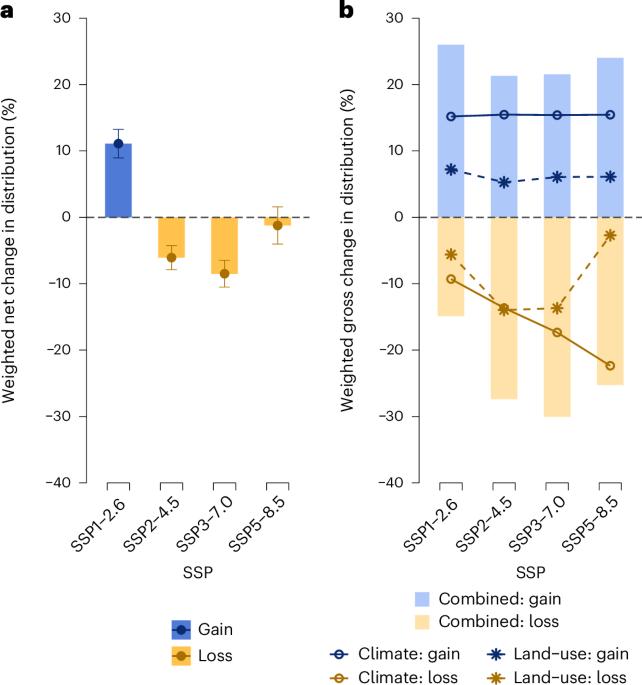保护东南亚树木需要减缓气候和土地使用的变化
IF 25.7
1区 环境科学与生态学
Q1 ENVIRONMENTAL SCIENCES
引用次数: 0
摘要
东南亚的森林拥有高度的物种多样性,提供了大量的生态系统服务。然而,这种生物多样性正受到气候和土地利用变化的威胁,人们对其影响知之甚少。我们模拟了四种具有不同全球变化强度的共享社会经济路径(SSPs)下 1498 种树木的分布情况,并将物种分为 11 个空间相关群组。我们发现这两种全球变化都会导致树木分布的严重损失。只有在全球变化强度较低的可持续路径 SSP1-2.6 中,分布损失才有所缓解。出乎意料的是,在中间气候变化路径 SSP2-4.5 和 SSP3-7.0 下,总体损失最大,而不是在最极端的路径 SSP5-8.5 下。这是因为,虽然在 SSP5-8.5 下气候驱动的损失最大,但在 SSP2-4.5 和 SSP3-7.0 下土地利用驱动的损失比在 SSP5-8.5 下要大得多。最重要的是,除 SSP1-2.6 外,每个 SSP 都会导致多个物种群出现最坏情况。我们的研究结果突出表明,要最有效地保护东南亚的树木分布,政策制定者需要优先考虑减缓全球变化的可持续途径。气候和土地利用变化等全球变化驱动因素会影响生物多样性地区,并破坏其提供的生态系统服务。本研究评估了此类全球变化驱动因素对东南亚森林树种分布的影响。本文章由计算机程序翻译,如有差异,请以英文原文为准。

Conserving Southeast Asian trees requires mitigating both climate and land-use change
The forests of Southeast Asia harbour high levels of species diversity, providing a plethora of ecosystem services. However, this biodiversity is threatened by both climate and land-use change, the impacts of which are poorly understood. We modelled 1,498 tree species distributions under four shared socioeconomic pathways (SSPs) with varying global change intensities, and classified species into 11 spatially associated groups. We found both global changes to cause severe losses in tree distributions. Only under SSP1–2.6, the sustainable pathway with low intensities in both global changes, were distribution losses mitigated. Unexpectedly, losses were overall greatest under intermediate climate change pathways SSP2–4.5 and SSP3–7.0 rather than under the most extreme pathway, SSP5–8.5. This was because, although climate-driven losses were greatest under SSP5–8.5, land-use-driven losses were much more extensive under SSP2–4.5 and SSP3–7.0 than under SSP5–8.5. Crucially, other than SSP1–2.6, each SSP led to worst-case scenarios for several species groups. Our findings highlight that to most effectively conserve Southeast Asian tree distributions, policymakers need to prioritize a sustainable pathway that mitigates both global changes. Global change drivers such as climate and land-use change can impact biodiverse regions and damage the ecosystem services they provide. This study assessed the impact of such global change drivers on tree species distributions across Southeast Asian forests.
求助全文
通过发布文献求助,成功后即可免费获取论文全文。
去求助
来源期刊

Nature Sustainability
Energy-Renewable Energy, Sustainability and the Environment
CiteScore
41.90
自引率
1.10%
发文量
159
期刊介绍:
Nature Sustainability aims to facilitate cross-disciplinary dialogues and bring together research fields that contribute to understanding how we organize our lives in a finite world and the impacts of our actions.
Nature Sustainability will not only publish fundamental research but also significant investigations into policies and solutions for ensuring human well-being now and in the future.Its ultimate goal is to address the greatest challenges of our time.
 求助内容:
求助内容: 应助结果提醒方式:
应助结果提醒方式:


